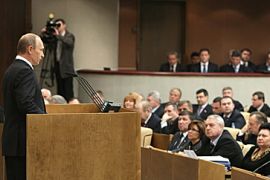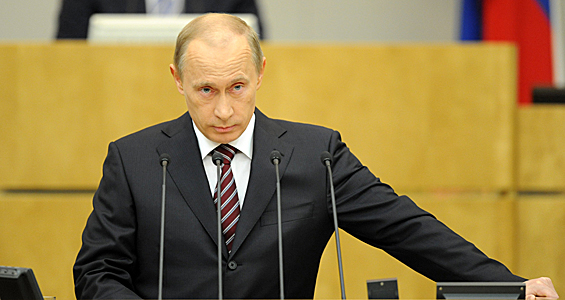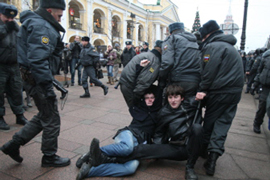Putin plots his ‘progress’ to Duma
In his annual report, Russia’s PM says 2009 will be a “difficult year” for the country.

 |
| Putin said Russians would face a ‘very difficult’ year in 2009 owing to the economic crisis [AFP] |
Russia’s financial crisis has stirred unrest across the country and there are even suggestions of a growing divide between Dmitry Medvedev, the country’s president, and Vladimir Putin, Russia’s prime minister, on how best to deal with the economy’s problems.
Putin defended his handling of the crisis in a 48-page annual report to the State Duma, Russia’s lower house, on Monday.
Keep reading
list of 4 itemsWhy are nations racing to buy weapons?
Parallel economy: How Russia is defying the West’s boycott
US House approves aid package worth billions for Ukraine, Israel
In the report, he touched on pensions, the banking system, social reform and a $90bn package of tax cuts.
Personal authority
During his time as president, Putin created a leadership largely dependent on his own personal authority.
He also presided over the longest economic boom in a generation, helped by the high prices of oil, gas and metals.
Russia’s GDP reached $1.7 trillion in 2008, up from $200bn in 1999, and many millions of Russians saw their standard of living rise.
But months after Putin stepped down from power, Russia was hit by the worst economic crisis in a decade raising concerns over how well Putin’s system would stand up.
The government’s handling of the crisis has exposed a rift between Putin and Medvedev, with the latter criticising the government several times for a slow response but stopping short of direct criticism of Putin.
Many analysts have questioned whether the financial crisis has exposed the first signs of a divide between the tough-talking Putin and the more measured and liberal Medvedev.
Monday’s report was seen by many as a chance for Putin to hit back at his critics.
Social unrest
Since the crisis began, Putin has fashioned a policy aimed at easing the country’s economic plight.
 |
| Putin’s, left, handling of the crisis has exposed a rift between himself and Medvedev [AFP] |
He wants to avert social unrest at all cost, which is why social reforms remain high on his agenda.
In Monday’s address, Putin said that state efforts should focus on reducing the social impact of the global credit crunch.
“The crisis must not demoralise Russian society that’s why 600bn more roubles are being allocated for social needs,” he said.
Putin also declared it was his intention to go ahead with pension reforms to an insurance-based system by next year.
“The current system” he said in his address, “does not guarantee Russians a comfortable old age”.
Putin also said that all types of fiscal burden on the economy – taxes, contributions and dues – must be eased at a time of crisis.
Banking lobby
Putin used Monday’s speech to declare the threat of the collapse of Russia’s banking system as over.
Russia has around 1,600 commercial banks and many have been hard hit by the crisis.
Last Friday, the heads of hundreds of financial institutions flocked to Moscow to lobby against a law that could see them close by the end of the year.
The government has been accused of disposing of these banks artificially rather than in market terms, but officials insist the law would weed out those banks that it says contribute little to Russia’s economy.
In his report, Putin called for the state to facilitate the consolidation of Russian banks without abrupt actions, and said “the presence of 1,600 banks in the country is hardly justified”.
Instead, he said he wanted to implement further measures to strengthen the country’s banking system.
“We must switch from emergency measures to rescue the banking sector, to a gradual expansion of its resource base, and make loans more accessible to companies and to private citizens,” Putin said.
Making capital available to ordinary Russians is one way of stimulating spending, but with interests rates as high as 13 per cent, people are reluctant to take loans, with many more already struggling to repay debts.
Countrywide protests
Russia’s car industry has been particularly hard hit by the global financial crisis.
The government has responded by increasing duty on foreign cars in a bid to stimulate a domestic market and discourage people from buying cheaper, imported products.
 |
| Unrest is usually out of sight in a country where the media is tightly controlled [AFP] |
But the move resulted in a number of protests across the country.
At the end of December 2008, Vladivostock was one of several cities to have seen demonstrations, with many in the city, which is located in the far east of the country, heavily dependent on foreign car imports from Japan.
It was feared that the new duty could push prices up by 50%.
There have also been a series of protests from other groups, with the most recent this week as thousands of Communists took to the streets calling for the government to resign.
In Moscow three months ago a group of Communists, radicals and democratic reformers called for a change in leadership.
Unsanctioned protests were violently broken up, dozens were arrested.
On the same day, Putin’s United Russia party held a massive pro-Putin rally a stones throw from the Kremlin.
Such unrest is usually out of sight in Russia in a country where the media is tightly controlled.
Whether the measures Putin announced on Monday will quell future protests remains to be seen.
In his own words, “2009 will be a difficult year for Russia.”